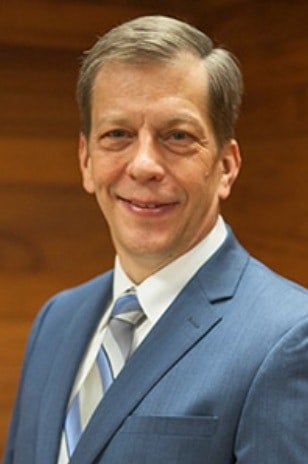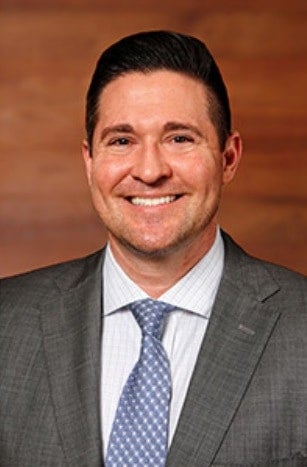FreightWaves had a chance to catch up with management at flatbed truckload company Daseke (NASDAQ: DSKE) following recently announced changes to the board and the resignation of its CEO Chris Easter.
Easter, who was helping navigate the company’s multi-phased turnaround, resigned effective Dec. 31 to attend to family-related obligations.
Change at the top but the path remains the same

Daseke Chairman Brian Bonner said that even though Easter will be missed, the company is in better shape to handle a departure of this magnitude than it was a year ago. Over the last year, Daseke has filled out its C-suite, including the appointment of Rick Williams to chief operating officer in May. His responsibilities have included the oversight of a number of business integrations and optimization efforts designed to improve financial results.
The restructuring has included the consolidation of some of Daseke’s separate flatbed operating companies, which were acquired over the last decade. Smaller and weaker-performing carriers have been rolled under larger or better-run operations to maximize best practices and returns. Other initiatives included divesting its oil rig transportation company, Aveda, trimming staff and disposing underutilized equipment.
Williams was the former CEO at Central Oregon Trucking, which was acquired by Daseke in 2013. He was previously running Daseke’s flatbed segment prior to the promotion.
Other roster additions have included filling the vacant CFO role with industry veteran Jason Bates and adding chief information and chief people officers.
“We feel comfortable that the strategy is going to continue and that the team is going to be able to continue to execute both on the tactical things that we have in front of us for 2021 as well as implementing the strategy going forward,” Bonner said.
The company’s new interim CEO, Jonathan Shepko, joined the Daseke board in 2017, most recently leading the operating committee overseeing the turnaround. Shepko is a co-founder and managing partner at private equity firm Stonehollow Capital. Throughout his career he has held leadership roles focused on the energy and infrastructure sectors at other private equity firms. Shepko has been involved with Daseke in some capacity for the last seven years.
The recent changes also included a 3 million share repurchase program to fund the executive incentive compensation plan, which management believes will be necessary to retain the talent that has been onboarded recently. Shepko said the omnibus plan will be accretive to earnings when it occurs.
Financial improvement opens door for acquisitions
The company’s streamlined operations have led to stronger financial results in the last two quarters reported.
During the third quarter, Daseke reported adjusted earnings per share of 31 cents versus the consensus call for a modest loss. Even though revenue declined 17% year-over-year, in part due to culling equipment and resources tied to less desirable freight, the company posted a consolidated adjusted operating ratio of 90.9%, 610 basis points better year-over-year.
Adjusted earnings before interest, taxes, depreciation and amortization climbed 37% year-over-year, excluding results at Aveda, and Daseke ended the quarter with $190 million in cash and $83 million available on its revolving credit facility. Total debt was reduced to less than $500 million net of cash, a $135 million reduction in one year, leaving its primary covenant – net debt-to-adjusted EBITDA – at 2.6x.
The financial upswing prompted a favorable outlook revision from ratings agency S&P Global (NYSE: SPGI) with the firm announcing that it expects continued improvement for the carrier in 2021.

Operational improvement, debt deleveraging, an improving cash profile (Daseke has generated slightly more than $50 million per quarter in free cash flow during 2020) and the potential for credit ratings upgrades and a lower cost of capital, should allow the company to get back to its roots of acquiring other flatbed carriers, a practice put on pause during the restructuring.
“Acquisitions are absolutely on the table now but operational performance across the business is a priority,” Shepko said. He believes the company will have “a much more thoughtful and sophisticated approach to M&A” this go-around as the remaining nine operating companies have set a high bar for financial expectations when vetting targets.
Further, he believes the streamlining of operations over the last two years has established the blueprint for integrating future deals.
“We understand and appreciate the capabilities of our operating companies. We’ve spent a lot of time conforming systems, conforming processes, really getting all of the operating companies to work together but still appreciating their respective differences with respect to customer base, end market, things like that,” Shepko said.
“We’ve proven now that we have the capabilities internally to evaluate processes and digest turnarounds and business improvements, whether we’re looking at an opportunity that is distressed, whether we’re looking at a healthy opportunity that gets us into a new end market or gets us a little closer to a big customer,” Shepko continued. “We think we have the latitude and the continuum of capabilities within the C-suite, within the operating companies, really to take down any of those accretive opportunities.”
The goal is to acquire companies that are immediately accretive before being integrated on the Daseke platform and before cost synergies and other efficiencies are realized. The approach is more strategic as management is thinking through the customers and geographies they want to pursue. They are evaluating how a potential target would benefit by working under an existing Daseke operating company and how that acquisition would allow Daseke to maximize the value it can extract from a particular geography or customer base.
In the past, the company would roll flatbed carriers under the Daseke umbrella with minimal integration, which left the organization operating as a company of multiple small companies and not really leveraging each entity to its fullest potential.
Shepko’s financial expertise is expected to be instrumental in structuring future M&A. There will be a balance struck between continuing to deleverage the balance sheet and obtaining the capital necessary to fund future deals, which may include new equity.
Board reboot
As previously announced, current director Chuck Serianni is expected to be elected chairman following the annual meeting, assuming he is reelected to the board. Serianni is the CFO at waste management company Republic Services (NYSE: RSG), which operates approximately 16,000 trucks daily.
Lyons Capital, which holds a 5% stake in Daseke, will be represented on the board by Grant Garbers. Garbers has an investment banking background and served as an independent director at Roadmaster Group, which was acquired by Daseke in 2017.
An executive search firm has been retained to find the next permanent CEO at Daseke. Bonner and the new CEO will be nominated for board seats as well.
Founder and Chairman Emeritus Don Daseke has been renominated for election to the board.
On the transformation and outlook, “we really wanted to show that we could manage the transition successfully so we put the acquisitions on hold back in 2019 and focused on that,” Bonner said. “Our goal was to build credibility, make those improvements and get in a position where we could start moving back to a growth posture.”








MrbigR504
Consolidate some of the flatbed companies…ohhh boy, here we go! To what extent?